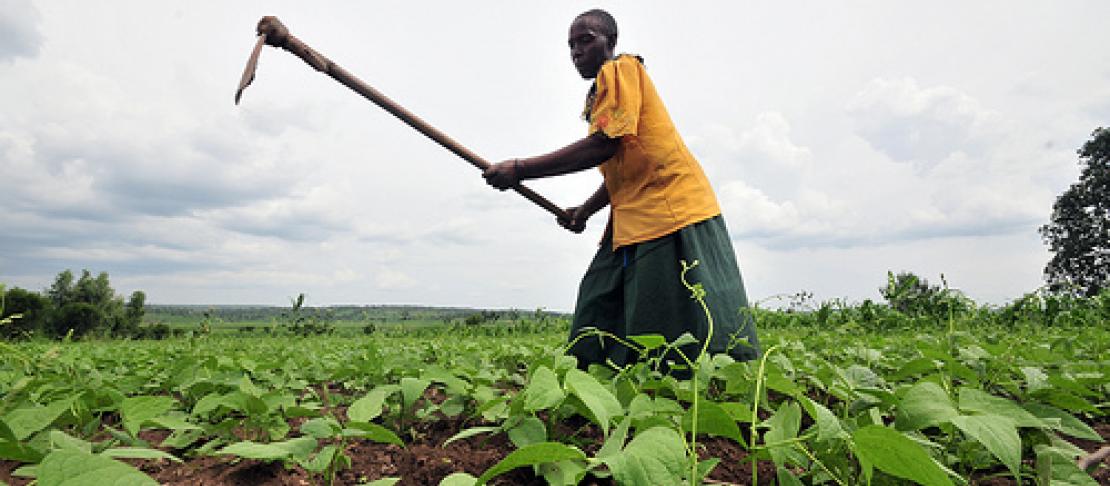Our only (food) security is our ability to change

by Sonja Vermeulen
Speak with one voice on agriculture! Such is the call of Tina Joemat-Pettersson, the South African Minister of Agriculture, to her peers across the continent as Durban hosts “Africa’s COP”. But should this unified voice emphasize vulnerability and negative impacts, or opportunity and potential?
The scientific consensus to date is that African agriculture will be hard hit by climate change. The last IPCC report concluded that some African countries might see yields of rainfed crops fall by 50% as soon as 2020; a more recent review has confirmed “high confidence” that agricultural production will be “severely compromised” across much of Africa during the 21st century. However, one shortcoming of most models and statistical studies is – as their authors readily acknowledge – that they do not take into account how farmers, markets and governments adapt to change.
Agricultural adaptation is the explicit focus of a new journal paper by B. G. J. S. Sonneveld, M. A. Keyzer, P. Adegbola and S. Pande, The Impact of Climate Change on Crop Production in West Africa: An Assessment for the Oueme River Basin in Benin. The authors have created a Decision Support Tool for Beninese researchers and policy-makers, which calculates food prices and farmers’ incomes under different adaptation scenarios. Drawing on multiple data sets, the tool’s components are a climatic General Circulation Model, a hydrological model, and functions of crop yields, farmers’ practices and prices (including the effects of domestic trade).
Like any model, the tool’s outputs entail uncertainty[1]. Yet the authors are optimistic about the power of adaptation to overcome the negative impacts of climate change on farming in the Oueme Basin. Comparing two 15-year periods, 1980–2003 and 2004–2030, climate change reduces yields of most crops (cassava, yam, maize, rice, soy, beans, sweet potatoes) but not sorghum, cotton and groundnut. Adaptation via shifting towards the latter crops compensates for lost revenues, with losses reduced even further when price responses to scarcity are considered. Reducing the length of fallows, coupled with modest increases in applied fertilizers and pesticides, can turn losses into revenue gains of up to 67%. There are opportunities too for livestock intensification and new cross-border markets.
Thus simple, affordable practices, supported by functional markets and policies, might be enough to avoid rising rural poverty under climate change, at least for some regions. Greater needs for labour may be limiting to some farmers but an opportunity for others. One trade-off is that shorter fallows and more fertilizer may increase greenhouse gas emissions, but this could be balanced by less expansion of cultivation into areas under natural vegetation. Anyway, African smallholders’ inputs are currently so low that it is hardly ethical or practical to seek reductions.
Africa’s unified voice should provide a realistic picture of future climate change conditions, acknowledging the negative impacts as well as the ability to change. Studies like this example from Benin raise cautious hope that wise policies and investments can enable farmers to minimize climate-related risks to their future food security.
[1] For example, this tool uses sensitivity analyses to estimate the effects of different climate change projections by different General Circulation Models.
Note: The title of this issue is adapted from a widely cited quotation from Dr John Cunningham Lilly
Links
- Climate 'threat to African food security' BUA news, 11 September 2011.
- Müller, C., Cramer, W., Hare, W.L., and Lotze-Campen, H. 2011. Climate change risks for African agriculture. Procedings of the National Academy of Sciences 108: 4313-4315. DOI: 10.1073/pnas.1015078108
- Sonneveld, B. G. J. S., Keyzer, M. A., Adegbola, P. and Pande, S. 2011. The Impact of Climate Change on Crop Production in West Africa: An Assessment for the Oueme River Basin in Benin. Water Resources Management. DOI: 10.1007/s11269-011-9931-x
- Liu, J., Fritz, S., van Wesenbeeck, C. F. A., Fuchs, M., You, L., Obersteiner, M., and Yang, H. 2008. A spatially explicit assessment of current and future hotspots of hunger in Sub-Saharan Africa in the context of global change. Global Planetary Change, 64: 222–235. DOI: 10.1016/j.gloplacha.2008.09.007
This is the December installation of AgClim Letters, a monthly e-bulletin on science and policy written by Sonja Vermeulen, Head of Research for CCAFS. Sign up to receive AgClim Letters bulletin and read past bulletins Your comments are welcome below.